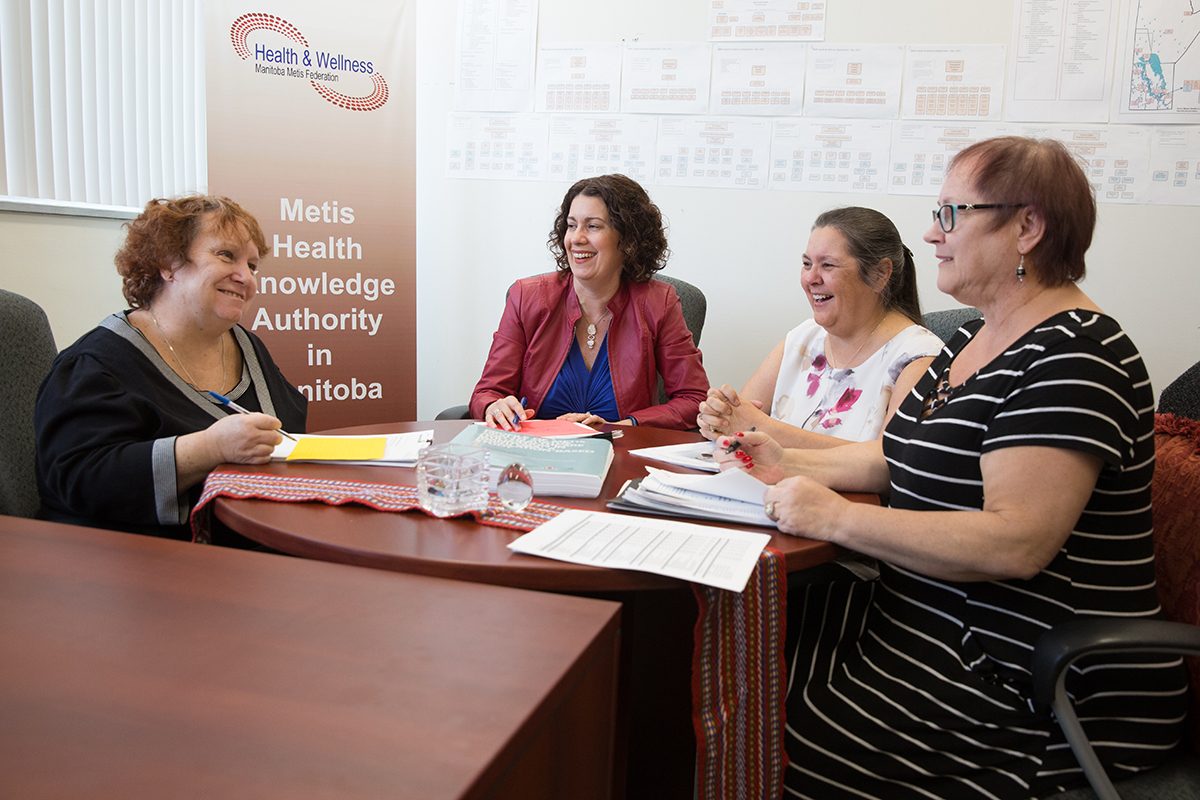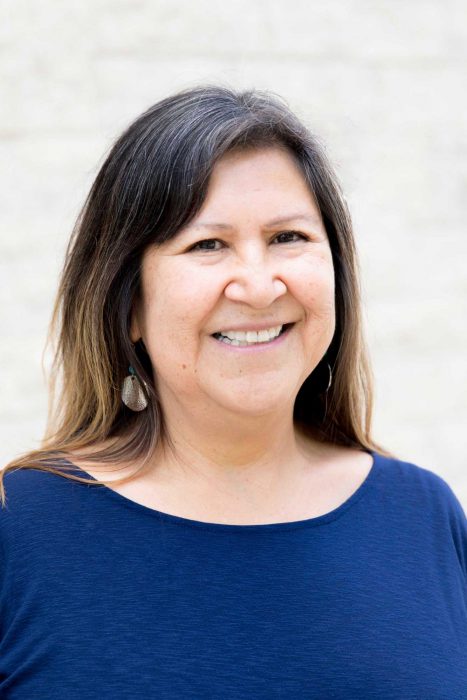
File photo: Michelle Driedger (community health sciences) with research partners at Manitoba Metis Federation, Georgina Liberty, Sheila Carter and Julianne Sanguins.
COVID-19 Rapid Response Program funding for studies in Indigenous populations
Two University of Manitoba researchers have received nearly $1 million in COVID-19 Rapid Response Program funding from the Canadian Institutes of Health Research for research projects that focus on public health responses in Indigenous populations.
This morning, the Honourable Patty Hajdu, Canada’s Minister of Health, and the Honourable Navdeep Bains, Canada’s Minister of Innovation, Science and Industry, announced an investment of nearly $27 million to fund 47 coronavirus research teams across Canada.
Dr. Michelle Driedger (community health sciences) is receiving $499,731 for her study titled: The paradox of precaution: Examining public health COVID-19 outbreak management strategies.
Driedger, a former Canada Research Chair in Environment and Health Risk Communications says, “When I did research on pandemic H1N1 – funded through two different grants, one looking at the Manitoba Métis experience and one looking more generally at general population Canadians – our funding came after the second wave of the pandemic was finished. That meant that any public perspectives of the handling of H1N1 – how they felt communicated with through the media or public health about the virus and the vaccine – all occurred almost a year after the vaccine rolled out. The amazing thing about this “rapid response” COVID-19 funding is that researchers have the funds while the outbreak is evolving in real time. This means we will be able to collect data and help inform public health response efforts as we develop new insights from our research projects.
“Our team’s research focus is on how members of the general public, including special targeted populations like the Métis, understand public health communication efforts about how they can protect themselves and their family. It is critically imperative to ensure that what public health is communicating is being understood as intended so that we may identify if any changes in the messaging may be needed to ensure that Canadians feel informed and empowered. To me, this early funding is such a gift!”
Dr. Stephane McLachlan (environment and geography) is receiving $500,000 for his study titled: kitatipithitamak mithwayawin: Indigenous-Led Planning and Responses to Coronavirus (COVID-19) and other Pandemics Then, Now, and Into the Future.
McLachlan says, “Past experiences with pandemics including H1N1 show that Indigenous communities have suffered much more than other Canadians. This project will mitigate any such impacts associated with COVID-19, in large part by working closely with these communities and Indigenous organizations when developing effective and culturally appropriate countermeasures. In a matter of a week, a remarkable diversity of Indigenous communities and organizations joined this project as partners, in part reflecting the great need for such a project but also reflecting an active desire to take a leadership role in how COVID-19 might be better managed moving forward.
Indigenous Scholar Myrle Ballard (chemistry) is co-investigator on the project with McLachlan and says, “This research will learn how First Nations dealt with pandemics in the past and how they coped. The timeliness of this research aligns with what First Nation communities are doing in preparation for a major pandemic. When the pandemic passes, this research will be a great tool for documenting ‘lessons learned’ that will be used for First Nations organizations, health care providers, and policy- and decision-makers.”
The intent of the project is to use COVID-19 as an opportunity to promote self-determination and affect positive change regarding pandemics and more generally health and health care as it relates to Indigenous communities.
“Research on this topic must be expedited to create a plan to protect vulnerable populations,” says Gail Braun, RN, a collaborator on the project. “My hope would be that the research would further highlight the importance of clean water access, address overcrowding and accommodate more appropriate health care that addresses body, mind, spirit and emotional needs.”
To learn more about this project and Wa Ni Ska Tan, visit http://hydroimpacted.ca/
Research at the University of Manitoba is partially supported by funding from the Government of Canada Research Support Fund.










This is wonderful.This is happening at a time when the scourge of COVID 19 is still being felt all over the world. We anticipate great results from the work of these researchers.This will help improve the knowledge about COVID 19,hence thereby curbing more spread and treating infected cases. RN. Clinical psychologist.